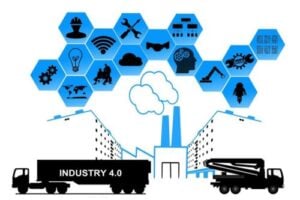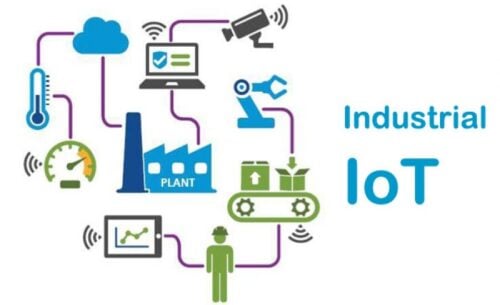Industrial Internet of Things & Industry 4.0
Internet of Things (IoT) is the new information technology (IT) that is drastically changing the way we do business. However, the impact of Internet of things in the manufacturing sector has yet been fully explored. Indeed, IoT is one of the main reasons behind the Industry 4.0 movement, as it will permit, data analytics and automation in addition to boost workflows. Interconnectivity, automation, machine learning, and real-time data are all part of Industry 4.0, a new phase in the Industrial Revolution.
In this article we will explain:
- What is IoT
- The impact of IoT on manufacturing
- What is IIoT
- What is industry 4.0
What is IoT?
According to Gartner, IoT as you know stand for Internet of things is defined as “the network of physical objects that contain embedded technology to communicate and sense or interact with their internal states or the external environment.” source. This means that all devices and sensors or things that are able to collect and transfer data over a wireless network without human intervention can be connected to the internet
The Impact of IoT on Manufacturing:
The Internet of Things (IoT) is the main reason behind the Industry 4.0 movement. Devices may be configured to operate in unison to create outputs on an assembly line thanks to the intelligence afforded by IoT. It can gather data on the state of the environment and equipment, allowing for the installation of fail-safes and smart technologies that allow for preventative maintenance or automatic recovery after failures.
Moreover, these devices will also be able to share data with analytics tools, allowing them to enhance and iterate workflows and processes in real time.
Thanks to analytics and data collected by IoT devices, we will be able to make insights and optimizations never before conceivable. In fact, the concept of a “smart factory” is not only a pipe dream for the future, but is now a reality. According to The Atlantic, 67% of industrial manufacturing businesses have a smart factory program in place.
What is IIoT?

The Industrial IoT, like the Internet of Things in general, encompasses a wide range of use cases, sectors, and applications.
The Industrial Internet of Things, also known as Industrial IoT, is an industrial framework in which a large number of devices or machines are connected and synchronized using software tools.
IIoT and machine-to-machine connectivity
The benefit of the frameworks and systems that IIoT refers to in the pure machine-to-machine and Industry 4.0 context is that they may run semi-independently or with very little human involvement.
Based on the information obtained through the feedback loops built inside the framework, such systems will be able to intelligently adapt and even modify their course of action.
Machine-to-machine communication (M2M) is a word that refers to specific activities in the early stages of the Industrial Internet of Things. It is a component of the Internet of Things.
Machine-to-machine communication aims to eliminate human interaction as much as possible in order to reach the maximum level of automation.
The advantages of IIoT in the context of industry:
- Connectivity between devices or equipment that is better and more intelligent.
- Increased productivity
- Save time and money.
- Industrial safety is improved.
What is industry 4.0?
Industry 4.0 is one of the big buzzwords that is flying around at the moment and it basically refers to the fourth revolution will we’ve seen transformative technologies that have changed the industry at the moment, this fourth industrial revolution sees smart factories with connected machines and intelligent robots.
Industry 4.0, also known as Industrial internet of things (IIoT) or smart manufacturing, combines physical manufacturing and operations with smart digital technologies, machine learning, and big data to create a more linked environment for manufacturing and supply chain management firms. While each company and organization is unique, they all confront the same challenge: the need for connectivity and real-time information across processes, partners, products, and people.
The Evolution of Industry
The first industrial revolution basically started in 1770 using machine, steam, water power. A hundred years later, electricity arrived and thus the next industrial revolution, so this gave us automation and assembly lines and this was the real start of factories. Other years later we have the computer arrived around 1970. So know we have computer that would allow us to automate.
Some of the blue-collar work in factories have electronics and this modern industrial revolution has just started, which we refer to as industry 4.0 is now looking at the entire network of computerized machines, which are all communicating with one another. We have intelligent factories, and the internet of things is one of the underlying technologies of this new industrial revolution, also we have smart machines with sensors in them that are connected to networks and communicate with one another, allowing them to diagnose their own problems and alert someone if something is wrong with the machines. Additionally, we now have big data, which means that all of these machines are generating massive amounts of data that we can now use and analyze. We can use artificial intelligence and machine learning to make sense of this data, allowing us to do things like predictive maintenance, where a machine or an assembly line will warn us that it might break down the next day and that we should fix it before it breaks down.
Zen Networks is a leading provider of advanced IT solutions, specializing in log monitoring, automation and DevOps.
Our expert team offers a wide range of services, including IT monitoring, cloud services, agile solutions, and automation. We are also well-versed in the installation and implementation of Elasticsearch, Logstask, and Kibana on Docker.
By leveraging our extensive domain expertise and innovative technologies, we empower our clients to optimize their IT infrastructure and achieve operational excellence. Our solutions are designed to help organizations of all sizes to streamline their processes, improve efficiency, and reduce costs.
We invite you to take advantage of our complimentary consultation and quote service to learn more about how we can help your organization to achieve its IT goals. Contact us now to schedule your consultation and discover the benefits of working with Zen Networks.
Author






